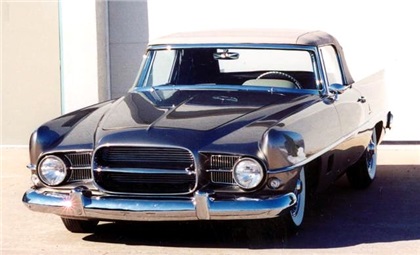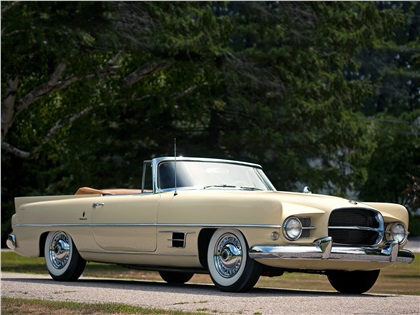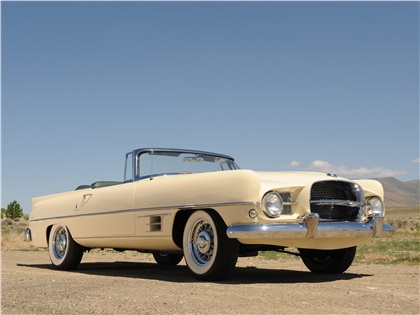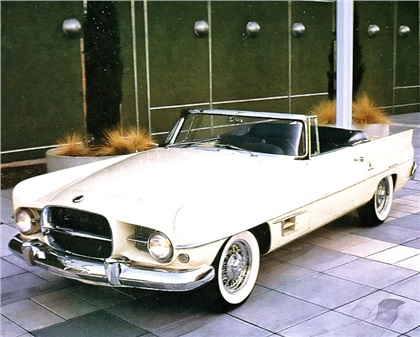Dual-Ghia Convertible, 1956
The idea of having Italian Craftsmen merge with Yankee engineering is
really nothing new. Many of the American Automakers sought out Italian
Design houses to produce stunning prototypes, and produce them at far
lower costs than they could have been here in the states. While Nash
utilized Pinninfarina to design their production vehicles, Chrysler
commissioned Carrozzeria Ghia.
Dual-Ghia Convertible, 1956
The Dual-Ghia was a favorite car of entertainment personalities during
the 1950's. The A-list of owners included popular celebrities such as
Debbie Reynolds, Lucille Ball, and Frank Sinatra. Each owned one of
these cars at one time or another, and so did a few of the infamous Rat
Pack. Peter Lawford even drove one on his television series, The Thin
Man. The Dual-Ghia was a custom-built sports car featuring a perfect
combination of Italian styling and Chrysler engineering.
Dual-Ghia Convertible, 1956
In the early ’50's, American auto shows were deluged with sporty coupe
and roadster concept cars. The Corvette was the first of these to go
into production in 1953, and GM also created the Oldsmobile F-88 roadster and the Olds Rocket V-8-powered Cutlass. Pontiac featured its Bonneville Special, and Buick showed its Wildcat and Wildcat II. But it was Chrysler that displayed the Virgil Exner-designed, Ghia-built Firearrow. Most of these show cars were realistic interpretations of the automobile designer’s vision of a personal sporty car.
Dual-Ghia Convertible, 1956
The Ghia-Chrsyler connection began in 1951 with Ghia’s execution of the K-310
show car designed by Virgil Exner. Chrysler continued to use Ghia’s
craftsmen to create other show cars, including a series based on the
Firearrow. These cars were so popular on the show circuit that Chrysler
investigated the possibility of producing a Firearrow on a limited
basis. However, Chrysler soon abandoned the idea, and that was when
Detroit industrialist Gene Casaroll stepped in. Casaroll was the head of
Auto Shippers Company and Dual Motors Corporation, an enterprise that
built twin-engine vehicles for the military during the war.
Dual-Ghia Convertible, 1956
Casaroll acquired the rights to the Firearrow. He instructed his chief
engineer, Paul Farago, to make the necessary modifications to the design
for the American market. Casarole renamed his new car The Firebomb,
and in 1955, the first prototype Dual-Ghia was built. Production was
scheduled to begin in 1956 (and unfortunately ended in 1958).
Dual-Ghia Convertible, 1956
The Dual-Ghia concept used the rugged, dependable, and well-proven Dodge
chassis, engines, and transmissions. This use of Chrysler engineered
underpinnings allowed the car to be repaired locally with standard Mopar
parts. The Ghia facility in Turin, Italy, headed by Luigi Segre, was
chosen to craft the elegant bodies. Once complete, the bodies were
shipped to Detroit and mated to the chassis. The Dual-Ghia used a
shortened Dodge passenger car chassis. Dodge also provided the Hemi
engine and Powerflite transmission. This made for an impressive package,
especially since the optional Dodge D-500 Hemi’s horsepower ratings
were consistently higher than those of the Corvette. Distinctive and
quite fast, it had a top speed of 120 mph according to a contemporary
road test.
Dual-Ghia Convertible, 1956
The Dual-Ghia was a handsome car, with its peaked front fenders,
single-bar grille, wire wheels and perky blade-like rear fins. The front
and rear were protected by sturdy Dodge bumpers. Inside, the Dual-Ghia
was luxuriously appointed, including English Connolly leather and fine
carpeting. The full complement of gauges included a tachometer. The
trunk was carpeted, as was the underside of the hood for sound
insulation.
Dual-Ghia Convertible, 1956
The first phase of the Dual-Ghia came to an end in 1958 when the
company’s supply of Dodge components ran out. The conversion of Chrysler
Corp’s cars to torsion bar front suspension for 1957, and its planned
changeover to unitized bodies in 1960, meant massive changes by
Dual-Motors if it were to continue the Dual-Ghia. The health of
Casaroll, the Dual-Ghia’s originator, began to fail and he wanted to
concentrate on his shipping business.
Dual-Ghia Convertible, 1957
In the ’50's, it was rare to see a show car turned into a production
vehicle. This stylish car, an unlikely marriage between Chrysler and
Ghia, became an instant hit with the Hollywood Elite. The Dual-Ghia was
the car to be seen in. One gossip columnist even commented that the
Rolls Royce was for the Hollywood rich who couldn’t get a Dual-Ghia. Out
of the 117 cars produced, 32 still existed as of July 2006. Some of the
American celebrities that owned one included Sterling Hayden, and
Richard Nixon. Desi Arnaz owned one, but he wrecked it. Ronald Reagan
owned one, which he lost in a high-stakes poker game with then-President
Lyndon Johnson, who kept the car for several years.



















